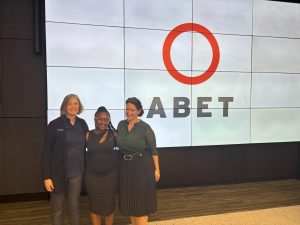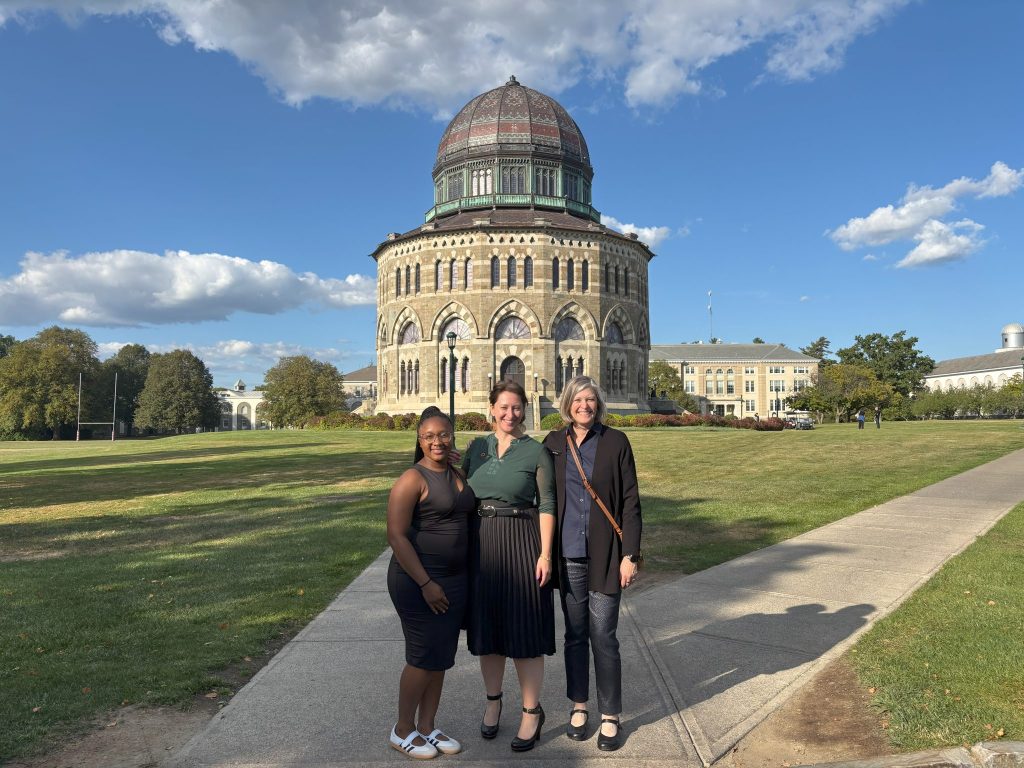
(Left to Right) Dr. Audra Morse, Makayla Headley and Dr. Amanda Taylor present at the 2025 Engineering and Liberal Education (ELE) Symposium.
“By dealing exclusively with empirical science and its applications, the engineer is led to forget, or never to realize that there are other branches of human thought equally important” – Charles Protus Steinmetz (1865–1923), alternating current pioneer.
Last week, ABET proudly participated in the 2025 Engineering and Liberal Education (ELE) Symposium, hosted by Union College’s Templeton Institute; ELE has led national conversations on integrating engineering and liberal education since 2008. This year’s symposium, under the theme, Engineering and Society, brought together educators, students and thought leaders to explore how engineering intersects with the humanities, arts and social sciences to better prepare graduates for a complex, interconnected world.
The symposium was planned and organized by the Co-Directors of the Templeton Institute: Dr. Ashok Ramasubramanian, Dean of Engineering and Dr. Andrew Burkett, Professor of English and Director of Science, Technology and Society. The diverse leadership team ensured that perspectives from both engineering and liberal arts pedagogies were represented and that the symposium featured several presentations that explored this intersection. A number of new ideas were investigated, and many new connections were made. Through two special presentations, well-attended from faculty and administrators across the United States, ABET showcased its thought leadership on how accreditation and quality assurance can support holistic engineering education:
Fostering Holistic Engineering Education: Leveraging ABET Offerings to Support Liberal Arts Education Integration
Presented by Makayla Headley (Clemson University/ABET intern), Dr. Audra Morse (ABET Engineering Accreditation Commission Executive Committee member, Michigan Technological University), and Dr. Amanda Taylor (ABET senior director of global communication and marketing), this session explored how ABET’s three quality assurance services — accreditation, credential recognition and assessment of student learning — contribute to integrated pedagogy. 
Integration and Impact: Enhancing Engineering Education Through Best Practices in Communication, Empathy and Critical Thinking
In this interactive workshop, Headley and Taylor led participants through activities and best practices mapped to ABET Criteria 3, 5 and 8. The workshop highlighted practical classroom strategies that embed ethical reasoning, teamwork and communication skills into curricula — turning accreditation requirements into opportunities for educational innovation.

(Left to Right) Makayla Headley, Dr. Amanda Taylor and Dr. Audra Morse at Union College’s Templeton Institute
“As a Ph.D. student, it’s inspiring to see faculty put so much thought into shaping student outcomes — knowledge, skills and abilities — that prepare graduates to confidently enter the workforce,” said Headley, reflecting on her work in assessing student learning. “Hearing presentations that integrated liberal education into engineering, I couldn’t help but wish I had experienced some of those creative courses as an undergraduate.”
“As a criteria expert, I know ABET supports educators in more than just technical rigor — we help inspire leadership, team building, ethical engagement and communication skills,” noted Morse.
The ELE Symposium continues to serve as a unique forum for bridging engineering with the liberal arts. ABET’s contributions reinforced our commitment to advancing excellence in technical education while empowering programs to graduate engineers who are not only technically proficient but also ethically grounded, socially conscious and ready to lead.
For more information about the symposium, visit the Union College ELE 2025 website.